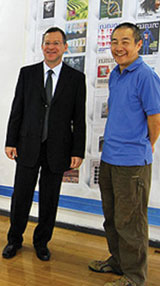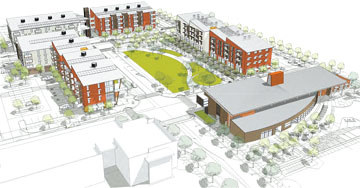Volume 29 · Number 1 · Fall 2011
News & Notes
A gigantic genomics collaboration

Harris Lewin, left, vice chancellor for research, with Jian Wang, director
of BGI, at an event in China announcing a new genomics partnership between
UC Davis and BGI, the world's largest genome sequencing institute. (Courtesy BGI)
UC Davis is teaming up with the world's largest genome sequencing institute, China's BGI, to conduct large-scale genome sequencing and functional genomics programs. The BGI@UC Davis Partnership will initially focus on food security, human and animal health, and biodiversity and environmental health.
"This partnership will bring together the unique strengths of two world-class institutions," UC Davis Chancellor Linda P.B. Katehi said during a June meeting to sign an agreement with BGI in Shenzhen, one of China's Special Economic Zones.
"BGI's resources in genome sequencing and bioinformatics, combined with UC Davis' expertise in biology, medicine, agriculture and the environment, will bring advantages to both partners as we take on crucial issues in food, health and sustainability," she said.
Genomics is a discipline of biology concerning the study of the genome, or all the genes of an organism. The field includes intensive efforts to determine the genomes of plants, animals, microbes and other living things, as a way to better understand how they grow, develop and function.
"Genomics is laying the foundation for the future research of biology, and this cooperation plays a significant role in the development of science and education between the two sides," said BGI Director Jian Wang.
The agreement will bring to UC Davis DNA sequencing instruments and bioinformatics specialists—scientists who apply statistics and computer science to molecular biology. And BGI researchers will gain access to the university's diverse resources and expertise in education and research, especially in biology, human and veterinary medicine, agriculture and the environment.
Harris Lewin, vice chancellor for research at UC Davis, said, "This new partnership will make possible entirely new insights into genome evolution, microbial ecology, plant biology, host-pathogen interactions and human diseases."
Founded in 1999 as the Beijing Genomics Institute, BGI now has about 4,000 employees and the capacity to sequence the equivalent of 1,600 complete human genomes each day.
Under construction at UC Davis: Energy efficiency housing

The largest planned zero net energy community in the U.S. is readying for its debut on campus this fall.
Now under construction, UC Davis West Village is combining advanced energy-efficient design features with a high-efficiency solar power system. Zero net energy means that the community will put back into the electrical grid, annually, as much electricity as it consumes.
UC Davis West Village integrates sustainable design to enable those living in the community to reduce their reliance on automobiles, limit energy consumption and leverage the local climate. Design features maximize on-site water retention, optimize solar orientation, use energy-efficient appliances and incorporate materials from renewable sources.
The 200-acre project is expected to eventually house about 4,500 people, including students, staff and faculty.
Phase I of the project is currently being built. It includes apartments for 2,000 people in The Ramble and Viridian; an education center for Los Rios Community College; recreation and study facilities; a village square surrounded by neighborhood-serving retail stores; and 343 single-family homes for sale to faculty and staff.
UC Davis West Village is the product of an innovative public-private partnership between UC Davis and West Village Community Partnership LLC, a joint venture led by San Francisco-based Carmel Partners and Urban Villages of Denver.
A wine history treasure trove
The family of the late Robert Mondavi—the winemaker who helped turn California into one of the world's premier wine regions—has donated his professional and personal papers to UC Davis.
The Mondavi papers include his correspondence with industry colleagues, international travel files, photographs, writings and speeches, and historical records of the Robert Mondavi Winery. The collection, which comprises more than 40 boxes worth of materials, will serve as a research asset for scholars around the world and provide insight into Mondavi's work and life as a winemaker, business leader and philanthropist.
The Department of Special Collections in UC Davis' Peter J. Shields Library will be the repository for the collection. Once cataloged, the papers will be accessible as research resources for both the university and the public.
"From 1936, when my family first came to Napa Valley, until his passing in 2008, my father amassed a lifetime's worth of knowledge and expertise," said Tim Mondavi '74, Robert's son.
Brain state affects memory recall
Lost your keys? Your brain might be in a better state to recall where you put them at some times than at others, according to new research from UC Davis.
"It's been assumed that the process of retrieving a memory is cued by an external stimulus," said Charan Ranganath, professor at the Center for Neuroscience and Department of Psychology. "But we found that the levels of brain activity before items came up were correlated with memory."
Ranganath was joined on the project by graduate students Richard Addante and Andrew Watrous, and Arne Ekstrom, assistant professor of psychology at the Center for Neuroscience. The team measured a particular frequency of brainwaves called theta oscillations in the brains of volunteers during a memory test. In the test, the volunteers had to memorize a series of words with a related context. They later had to recall whether they had seen the word previously and the context in which the word was seen.
High theta waves immediately before being prompted to remember an item were associated with better performance.
It's not clear whether it is possible to deliberately put your brain into a better state for memory recall, Ranganath said. The laboratory is currently investigating this issue with the hope that it might lead to better treatments for memory loss.
More youth at Guantánamo than U.S. claimed
Fifteen juveniles spent time as prisoners at the Guantánamo Bay detention camp—three more than the U.S. State Department had publicly acknowledged, the UC Davis Center for the Study of Human Rights in the Americas reports. The finding is based on an analysis of military documents recently made public by WikiLeaks.
"This is one more reason for a full, independent and transparent inquiry into the policies and practices of detention we have engaged in since 9/11," said Almerindo Ojeda, director of the center and principal investigators for its Guantanamo Testimonials Project.
Architects and scientists

For centuries, nature has inspired architectural design, but recent computer-based technologies are giving architects new tools to mimic nature. To explore this transformation, Christina Cogdell, an associate professor of architectural and design history, has received a $225,000 New Directions Fellowship from The Andrew W. Mellon Foundation. Cogdell will examine specific collaborations between architects and scientists and also explore the desire of some architects to grow living buildings out of cells, using computer-based design and production allied with the technologies of genetic and tissue engineering.
